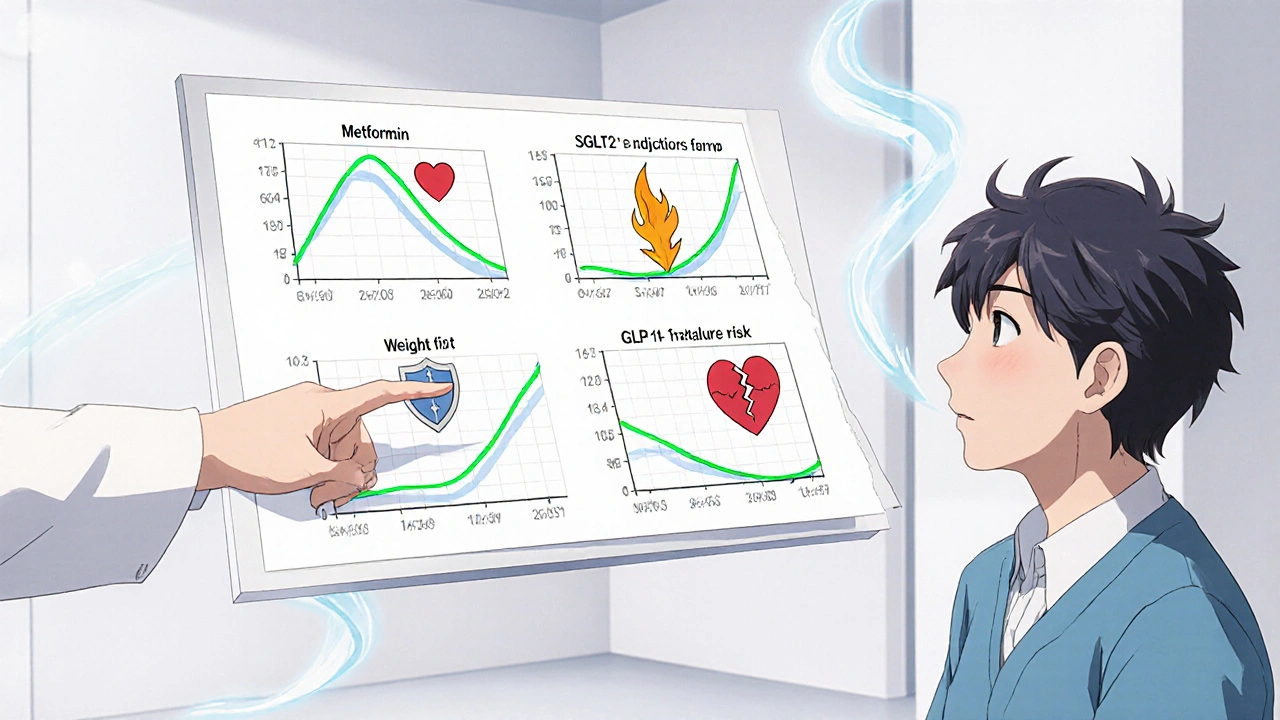Diabetes Medication Comparison Calculator
Find the best diabetes medication for your situation
Based on your health profile, we'll show which alternatives to Actos (pioglitazone) might work best for you.
Your Health Profile
Recommended Alternatives
Based on your profile, these medications may be better options than Actos for you:
If you're taking Actos (pioglitazone) for Type 2 diabetes and wondering if there's a better option, you're not alone. Many people on this medication face side effects like weight gain, swelling, or concerns about long-term risks - and start looking at alternatives. The truth? There are several other drugs that work differently, often with fewer downsides. But which one is right for you? It depends on your body, your goals, and what you're trying to avoid.
What Actos (Pioglitazone) Actually Does
Actos belongs to a class of drugs called thiazolidinediones, or TZDs. It doesn't lower blood sugar by making your pancreas pump out more insulin. Instead, it makes your body's cells - especially muscle and fat cells - more sensitive to insulin. Think of it like unlocking doors so glucose can get inside and be used for energy. This helps lower blood sugar without forcing your pancreas to overwork.
But here’s the catch: it takes weeks to kick in. Most people don’t see full effects until 6-12 weeks. And while it can improve insulin resistance - a core problem in Type 2 diabetes - it also comes with real risks. Studies show a 30-40% higher chance of heart failure in people taking pioglitazone compared to placebo. It’s also linked to bone fractures in women over 50 and fluid retention that can worsen heart or kidney conditions.
The FDA issued a black box warning in 2007 about heart failure risk. That’s the strongest warning they give. So if you have a history of heart problems, Actos is often ruled out from the start.
Metformin: The First-Line Standard
Most doctors still start with metformin. Why? It’s been used for over 60 years, it’s cheap, and it works well for most people. Unlike Actos, metformin doesn’t cause weight gain - in fact, many people lose a few pounds. It reduces liver glucose production and improves insulin sensitivity, but without the fluid retention or bone risks.
A 2023 analysis of 12 major trials found that metformin lowered HbA1c (a measure of long-term blood sugar) by an average of 1.1-1.5% over six months. Actos does about the same - around 1.0-1.4%. So in terms of blood sugar control, they’re close. But metformin wins on safety.
Side effects? Mostly stomach upset - diarrhea, nausea, gas. These usually fade after a few weeks. Extended-release versions help reduce this. And unlike Actos, metformin has been linked to a lower risk of heart disease and even some cancers in long-term users.
If you’ve never tried metformin, or stopped it because of side effects, it’s worth revisiting. Many people can tolerate it now with the right dose and timing.
SGLT2 Inhibitors: Newer, with Real Heart Benefits
Drugs like empagliflozin (Jardiance), dapagliflozin (Farxiga), and canagliflozin (Invokana) are called SGLT2 inhibitors. They work by making your kidneys flush out extra sugar through urine. That means you lose calories - and often lose weight. People on these drugs typically drop 2-5 kg in the first few months.
But the real game-changer? These drugs cut the risk of heart failure hospitalization by 30-35% and reduce the chance of kidney disease progression. That’s huge for people with diabetes who also have heart or kidney issues.
A 2024 study in The New England Journal of Medicine followed over 10,000 people with Type 2 diabetes and heart disease. Those on dapagliflozin had 31% fewer heart-related deaths than those on placebo. Actos didn’t show this benefit.
Downsides? You might get more yeast infections or urinary tract infections. Dehydration risk if you’re not drinking enough water. And they’re more expensive than metformin or Actos - but many insurance plans now cover them because of their proven outcomes.
GLP-1 Receptor Agonists: Weight Loss and Protection
These are injectables like semaglutide (Ozempic, Wegovy), liraglutide (Victoza), and dulaglutide (Trulicity). They mimic a gut hormone that tells your brain you’re full and helps your pancreas release insulin only when blood sugar is high.
People on semaglutide lose 10-15% of their body weight on average. That’s not just cosmetic - it reverses insulin resistance. One study showed 61% of people with Type 2 diabetes and obesity went into remission after 12 months on semaglutide.
They also lower heart attack and stroke risk by up to 26%. Unlike Actos, they don’t cause fluid retention or bone fractures. They’re now recommended as first-line for people with heart disease or obesity, even before metformin in some cases.
But they’re pricey. A month’s supply can cost $800-$1,200 without insurance. And side effects include nausea, vomiting, and slow stomach emptying - which can be rough at first. Still, for many, the benefits outweigh the discomfort.

Other Options: DPP-4 Inhibitors and Insulin
DPP-4 inhibitors like sitagliptin (Januvia) and linagliptin (Tradjenta) are oral pills that boost natural insulin release. They’re weight-neutral and low-risk for low blood sugar. But they’re not as strong - they typically lower HbA1c by only 0.5-0.8%. That’s less than Actos, and they don’t offer heart or kidney protection.
Insulin is the most powerful tool, but it’s also the most complex. It works fast and lowers blood sugar hard - but you have to monitor closely. Risk of low blood sugar is real. Weight gain is common. Most doctors reserve insulin for when other drugs fail, or when HbA1c is above 9%.
Comparison Table: Actos vs Key Alternatives
| Medication | Class | HbA1c Reduction | Weight Effect | Heart Failure Risk | Key Risks | Cost (Monthly, USD) |
|---|---|---|---|---|---|---|
| Actos (Pioglitazone) | TZD | 1.0-1.4% | Gain 2-5 kg | Increased | Bone fractures, fluid retention | $10-$40 |
| Metformin | Biguanide | 1.1-1.5% | Loss or neutral | Neutral or reduced | GI upset (usually temporary) | $5-$20 |
| Empagliflozin (Jardiance) | SGLT2 Inhibitor | 0.7-1.0% | Loss 2-4 kg | Reduced | Yeast infections, dehydration | $150-$300 |
| Semaglutide (Ozempic) | GLP-1 RA | 1.3-1.8% | Loss 5-15 kg | Reduced | Nausea, vomiting, slow digestion | $800-$1,200 |
| Sitagliptin (Januvia) | DPP-4 Inhibitor | 0.5-0.8% | Neutral | Neutral | Pancreatitis (rare) | $300-$500 |
Who Should Stay on Actos?
Not everyone needs to switch. Actos might still be right for you if:
- You have severe insulin resistance and other drugs haven’t worked
- You don’t have heart failure, bone loss, or fluid retention issues
- You’re on a tight budget and can’t afford newer drugs
- Your doctor has monitored you for years and your labs are stable
But if you’ve gained weight, feel puffy in your legs, or have been told you have early signs of heart strain, Actos may be doing more harm than good.

What to Do Next
If you’re on Actos and thinking about alternatives:
- Check your HbA1c. Is it still above 7%? If yes, you may need a stronger or different approach.
- Review your weight and blood pressure. Are they trending up? That’s a red flag for Actos.
- Ask your doctor for a kidney function test (eGFR) and heart scan if you have symptoms like shortness of breath.
- Ask about trying metformin first - it’s safe, cheap, and effective for most.
- If you have heart or kidney disease, push for an SGLT2 inhibitor or GLP-1 RA. These aren’t just alternatives - they’re protective.
Don’t stop Actos on your own. Tapering off requires medical supervision. But you absolutely have options. The diabetes landscape has changed a lot since Actos was first approved in 1999. You don’t have to settle for a drug that comes with hidden risks when safer, more powerful tools exist.
Frequently Asked Questions
Is Actos still prescribed today?
Yes, but less often. Actos is still used in some cases - especially when cost is a barrier or when patients have severe insulin resistance that doesn’t respond to other drugs. However, most new prescriptions go to SGLT2 inhibitors or GLP-1 receptor agonists because of their heart and kidney benefits. Doctors now see Actos as a second- or third-line option.
Can Actos cause cancer?
Early studies in the 2000s raised concerns about bladder cancer, especially with long-term use (over 5 years). Later, larger reviews by the FDA and European Medicines Agency found no clear link. But if you have a history of bladder cancer, Actos is usually avoided. Regular urine checks are recommended if you’ve been on it for years.
How long does it take for alternatives to work?
Metformin and DPP-4 inhibitors usually show effects in 1-2 weeks. SGLT2 inhibitors start lowering blood sugar in days, but weight loss takes weeks. GLP-1 agonists like Ozempic take 4-8 weeks for full effect, and weight loss continues over months. Actos takes the longest - up to 12 weeks. Patience matters, but so does monitoring.
Are there natural alternatives to Actos?
There’s no herbal supplement that replaces Actos’s mechanism. But lifestyle changes - weight loss, walking 30 minutes daily, eating more fiber, and cutting processed carbs - can improve insulin sensitivity as much as or more than any pill. Some people reduce or even stop diabetes meds after losing 10% of their body weight. Supplements like berberine show promise in small studies, but they’re not regulated or proven long-term.
What’s the safest diabetes medication overall?
For most people without heart or kidney disease, metformin remains the safest and most studied option. For those with heart failure, obesity, or kidney problems, SGLT2 inhibitors or GLP-1 agonists are safer and more protective than Actos. The safest drug is the one that matches your health profile - not the cheapest or the oldest.
Final Thoughts
Actos helped many people manage their blood sugar - but it was designed for a different era of diabetes care. Today, we know more about how to protect the heart, kidneys, and overall health of people with Type 2 diabetes. You don’t have to stick with a drug just because you’ve been on it for years. Talk to your doctor. Ask about alternatives. And don’t be afraid to ask: Is this still the best choice for me - right now, in 2025?


Comments
Shanice Alethia
Actos is a walking time bomb wrapped in a prescription bottle. I was on it for 18 months and woke up one day with ankles the size of grapefruits and a heart that felt like it was running a marathon while I was sitting on the couch. My endo acted like it was normal. It’s NOT normal. Switched to Jardiance - lost 14 pounds in two months, no puffiness, and my HbA1c dropped to 5.8. If you’re still on Actos, you’re not managing diabetes - you’re just delaying a hospital visit.
Steven Shu
Shanice’s right - Actos is outdated. But let’s not throw the baby out with the bathwater. Metformin isn’t glamorous, but it’s the backbone of diabetes care for a reason. I’ve been on it for 12 years. Side effects? Yeah, I had the runs for a week. Now? Zero issues. I’ve got friends on Ozempic who can’t eat a full meal without nausea. Sometimes the boring option is the smart one.
Robert Burruss
It’s interesting how we frame these medications as ‘alternatives’ - as if there’s a singular optimal path. But diabetes isn’t a one-size-fits-all condition; it’s a constellation of metabolic, genetic, and environmental variables. Actos, despite its risks, modulates adipose tissue insulin sensitivity in a way that SGLT2 inhibitors simply cannot replicate - especially in lipodystrophic phenotypes. The data is clear on cardiovascular outcomes, yes - but we’re reducing complex physiology to a spreadsheet of HbA1c and weight metrics. The real question isn’t ‘which drug?’ - it’s ‘which patient?’
Alex Rose
Correction: The HbA1c reduction for semaglutide is 1.3–1.8%, not ‘up to 2%’ as implied. Also, the term ‘remission’ is misleading - it’s ‘drug-induced euglycemia,’ not true beta-cell recovery. And ‘weight loss of 10–15%’? That’s mean, not median. Most patients lose 7–12%. Also, ‘GLP-1 RA’ is the correct abbreviation - not ‘GLP-1 agonists.’ Precision matters.
Vasudha Menia
Hi everyone 😊 I was on Actos for 3 years and felt so hopeless - gained 20 lbs, always tired, my knees hurt. Then my doctor switched me to Farxiga and I cried the first time I could climb stairs without stopping. It’s not magic, but it’s hope. You’re not broken - you just haven’t found your right fit yet. And if cost is a problem, ask about patient assistance programs. You deserve to feel good 💪❤️
Mim Scala
I’ve been a type 2 diabetic for 17 years. I’ve tried everything. Actos? I tolerated it, but never felt better. Metformin? Too much GI chaos. Jardiance? Perfect. No weight gain, no crashes. I’m not a fan of hype - but the kidney and heart data for SGLT2 inhibitors is too compelling to ignore. If your doctor isn’t offering it as a first alternative, ask why. Not because it’s trendy - because the evidence is solid.
Bryan Heathcote
Wait - so Actos increases heart failure risk by 30–40%? That’s insane. And nobody told me this when I was prescribed it 5 years ago. My doctor said ‘it’s fine if your heart’s okay.’ But what does ‘okay’ even mean? I had an echo last month and they found mild LVH. Now I’m scared. Is it reversible? Should I be worried about long-term damage? Someone please tell me what to ask my endo tomorrow.
Snehal Ranjan
Respected colleagues and fellow travelers on this journey of metabolic healing I must express with profound humility that the modern paradigm of pharmaceutical intervention often overlooks the foundational truth that food is the first medicine. The Indian Ayurvedic tradition speaks of Madhumeha not as a disease to be suppressed but as a signal of imbalance. A diet rich in bitter gourd fenugreek and turmeric combined with daily walking after meals has restored normalcy to many in my village. Medications may assist but they cannot replace the sacred rhythm of nature. Let us not forget that the body remembers its harmony.
Sabrina Aida
How convenient that Big Pharma suddenly discovered ‘heart benefits’ in new drugs right after Actos’s patent expired. Let’s be real - this isn’t science. It’s marketing. The FDA’s black box warning was buried. The real scandal? They never tested Actos against metformin in a head-to-head trial for mortality. Coincidence? I think not. The system doesn’t care if you live - it cares if you keep buying pills.
Patrick Hogan
So you’re telling me I should switch from a $15/month drug to an $800/month drug… because it’s ‘safer’? What’s next? We all get a personal endocrinologist on speed dial? I’ve got a job that doesn’t cover insurance. My ‘heart risk’ is paying rent. Actos keeps me alive. If you’re rich enough to choose, good for you. The rest of us are just trying not to die before next month’s paycheck.
prajesh kumar
My friend lost 18 kg on Ozempic and now he runs marathons. I am 65 and I walk 5 km every morning. My sugar is under 7. I don’t need expensive pills. I need discipline. I need food that is real. I need sleep. I need joy. Medicine helps but it is not the answer. The answer is in your kitchen and your feet. Start today. You can do it.
Kshitiz Dhakal
Actos is a relic of 20th-century pharmacology - a blunt instrument applied to a system that demands nuance. The GLP-1 agonists represent not merely therapeutic evolution but epistemological rupture: a shift from glycemic control to metabolic reprogramming. The SGLT2 inhibitors? They are not drugs - they are physiological interventions that reconfigure renal homeostasis. We are no longer treating diabetes. We are recalibrating human biochemistry.
Mer Amour
People who switch off Actos are just chasing trends. I’ve been on it since 2010. My HbA1c is 6.2. My kidneys are fine. My heart is fine. My doctor monitors me. You don’t know my body. You don’t know my history. You just read a blog. Stop preaching. Not everyone needs to be on the latest $1,000 pill to be healthy. Some of us just need consistency - and respect.